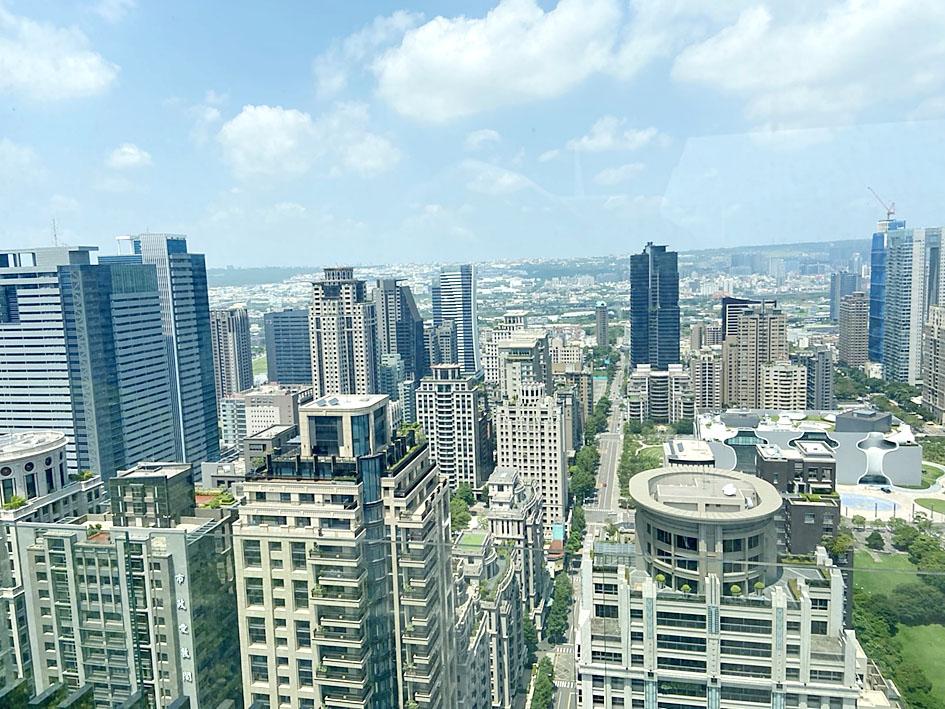Developers and builders last quarter introduced NT$349.5 billion (US$12.09 billion) of presale and new housing to the market, an 8.7 percent quarterly decline, while benefiting from a modest increase in selling prices and sales rates, a survey by Cathay Real Estate Development Co (國泰建設) showed yesterday.
A recovery was previously evident in commercial and land deals, but the data now supports that the upward trend has spread to residential properties, especially presale projects.
“The local property market has seen signs of recovery judging by the price hikes and stable volume,” the report said.

Photo: Hsu Yi-ping, Taipei Times
The upturn came in line with property prices in the UK, the US and Germany, since authorities in those states cut interest rates to support their economies, it said.
However, uncertainty lingers regarding the global economy, as COVID-19 infections are spiking in Europe and the US — although the world has better adapted to the pandemic, it added.
Presale projects and new housing nationwide averaged NT$303,000 per ping (3.3m2) between July and September, rising 1.98 percent from the second quarter, it said.
The 30-day sales rate gained 1.17 percentage points to 12.2 percent, while the transaction index picked up 25.98 percent to 368.03, it said, adding that price concession rates rose 1.13 percentage points to 14.42 percent.
By regional breakdown, property prices in Taipei grew fastest at 5.06 percent to NT$865,300 per ping, although sales volume shrank 10 percent, it said, calling the trend stable, but meriting caution.
The situation in New Taipei City saw improvement on all fronts: The 30-day sales rate stood at 10.41 percent, selling prices rose 3.09 percent to NT$415,600 per ping and the transaction index climbed to 404.53, it said.
“The market in New Taipei City appears on course to overheat,” it said.
Properties in Taoyuan continued to benefit from enhanced infrastructure, notably the Taiwan Taoyuan International Airport Access MRT System that links the special municipality with Taipei and New Taipei City, it said.
Average housing prices in Taoyuan stood at NT$26,600 per ping, virtually flat from a quarter earlier, while the 30-day sales rate rose to 11.12 percent and the transaction index advanced to 463.74, it said.
Property prices in Taichung declined 6.5 percent to NT$256,800 per ping, but the 30-day sales rate rose to 13.28 percent and the transaction index increased to 441.15, it said.
In Tainan, presale and new housing prices increased 2.7 percent to NT$24,900 per ping, while prices edged up 0.82 percent in Kaohsiung to NT$239,000 per ping, it said.
Condo apartments priced at NT$13.96 million per unit were the quarter’s hot product, it said.

South Korea’s equity benchmark yesterday crossed a new milestone just a month after surpassing the once-unthinkable 5,000 mark as surging global memory demand powers the country’s biggest chipmakers. The KOSPI advanced as much as 2.6 percent to a record 6,123, with Samsung Electronics Co and SK Hynix Inc each gaining more than 2 percent. With the benchmark now up 45 percent this year, South Korea’s stock market capitalization has also moved past France’s, following last month’s overtaking of Germany’s. Long overlooked by foreign funds, despite being undervalued, South Korean stocks have now emerged as clear winners in the global market. The so-called “artificial intelligence

NEW IDENTITY: Known for its software, India has expanded into hardware, with its semiconductor industry growing from US$38bn in 2023 to US$45bn to US$50bn India on Saturday inaugurated its first semiconductor assembly and test facility, a milestone in the government’s push to reduce dependence on foreign chipmakers and stake a claim in a sector dominated by China. Indian Prime Minister Narendra Modi opened US firm Micron Technology Inc’s semiconductor assembly, test and packaging unit in his home state of Gujarat, hailing the “dawn of a new era” for India’s technology ambitions. “When young Indians look back in the future, they will see this decade as the turning point in our tech future,” Modi told the event, which was broadcast on his YouTube channel. The plant would convert

‘SEISMIC SHIFT’: The researcher forecast there would be about 1.1 billion mobile shipments this year, down from 1.26 billion the prior year and erasing years of gains The global smartphone market is expected to contract 12.9 percent this year due to the unprecedented memorychip shortage, marking “a crisis like no other,” researcher International Data Corp (IDC) said. The new forecast, a dramatic revision down from earlier estimates, gives the latest accounting of the ongoing memory crunch that is affecting every corner of the electronics industry. The demand for advanced memory to power artificial intelligence (AI) tasks has drained global supply until well into next year and jeopardizes the business model of many smartphone makers. IDC forecast about 1.1 billion mobile shipments this year, down from 1.26 billion the prior

People stand in a Pokemon store in Tokyo on Thursday. One of the world highest-grossing franchises is celebrated its 30th anniversary yesterday.